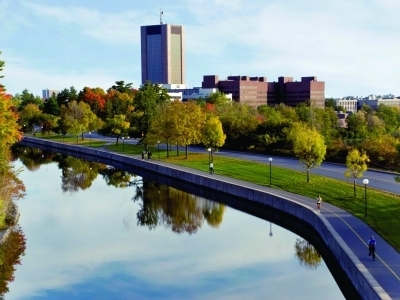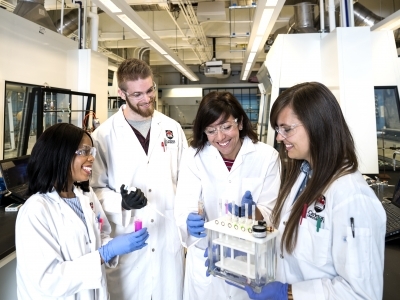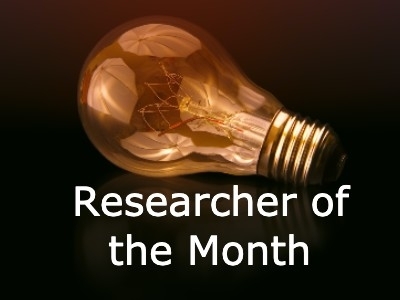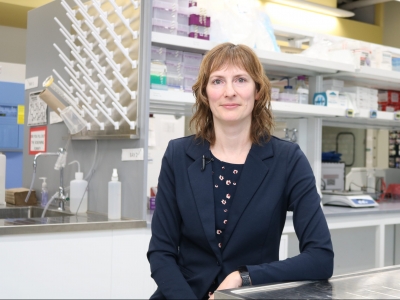Worldwide, the National Parkinson Foundation estimates that four to six million people suffer from Parkinson’s disease (PD).
PD is a neurodegenerative brain disorder that progresses slowly in most people. There is no cure. But several people, including faculty and graduate students at Carleton University, are looking at increasing our understanding of this disease in the hopes that new novel treatments can be found.
 Last fall, Neuroscience PhD student, Chris Rudyk, received a Toth Family Fellowship of $15,000, generously donated by the Toth Family, from the Parkinson’s Research Consortium (PRC) to assist him in his graduate research about PD.
Last fall, Neuroscience PhD student, Chris Rudyk, received a Toth Family Fellowship of $15,000, generously donated by the Toth Family, from the Parkinson’s Research Consortium (PRC) to assist him in his graduate research about PD.
“This money has allowed me to allocate more time and energy into my studies,” says Rudyk. “Now, I get to do what I love which is understanding the puzzle that is the brain and, in particular, the underlying mechanisms involved in Parkinson’s disease development.”
Rudyk says: “We believe that combined genetic and immune modulatory strategies will herald in the next wave of clinical interventions for the disease. Hopefully my research will help to aide in the development and understanding of mechanisms involved so that treatment interventions can be developed to halt or slow the progression of the disease.”
The grad student initially entered this field because of his personal interest in understanding the brain. “My interests slowly gravitated to understanding the underlying brain mechanisms in Parkinson’s disease during the first year of my Master’s degree in Neuroscience as I became more advanced in my hunger for understanding this extremely complex disease.”
Rudyk is supervised by Dr. Shawn Haley, a renowned expert on Parkinson’s, along with a team of other Carleton grad students.
 Kyle Farmer is also working in Dr. Hayley’s lab. He fast tracked from his Master’s into the PhD program last summer. He too is looking at potential treatment options for PD. He is focusing on two molecules that have already shown promise as being protective in stroke and neuronal injuries.
Kyle Farmer is also working in Dr. Hayley’s lab. He fast tracked from his Master’s into the PhD program last summer. He too is looking at potential treatment options for PD. He is focusing on two molecules that have already shown promise as being protective in stroke and neuronal injuries.
“I am looking at their regenerative effects,” explains Farmer. “We have been able to show that these two cytokines are able to repair neuronal injury well after the initial damage and it looks like they may actually induce neuronal regeneration.”
Farmer has won several awards for his research. Last fall, he became President of the local chapter of the international Society for Neuroscience. Currently, the Ottawa chapter has over 200 members from various research institutions, including many from Carleton University.
Rudyk and Farmer say that pursuing his PhD in the Department of Neuroscience at Carleton has been a rewarding experience.
Says Rudyk: “I have had the opportunity to learn and receive guidance from some of the most amazing faculty members in the department who are not only top cutting edge researchers in their field but who are also outstanding educators. The guidance and expertise that I have received from my own advisor Dr. Shawn Hayley has been impeccable. In addition, the friendships gained during the ups and downs of the often times intense educational experience have allowed me to go outside the goals I have set for myself. When taken together, the experience to date has allowed me to develop a number of positive skills which will hopefully market me in the work force one day whether it be as an educator or a researcher.”
Adds Farmer: “My time at Carleton has been amazing. I am able to design and carry out the research that I want to do, with the full support of not only my professor Dr. Hayley but also with the support of the entire Department of Neuroscience. Our Department encourages and facilitates collaboration, which has allowed to meet, train and work with some of the best researchers here at Carleton and across the country. The support I have received from Carleton has without a doubt helped me become the researcher that I am today.”
Friday, April 17, 2015 in News, Research
Share: Twitter, Facebook



